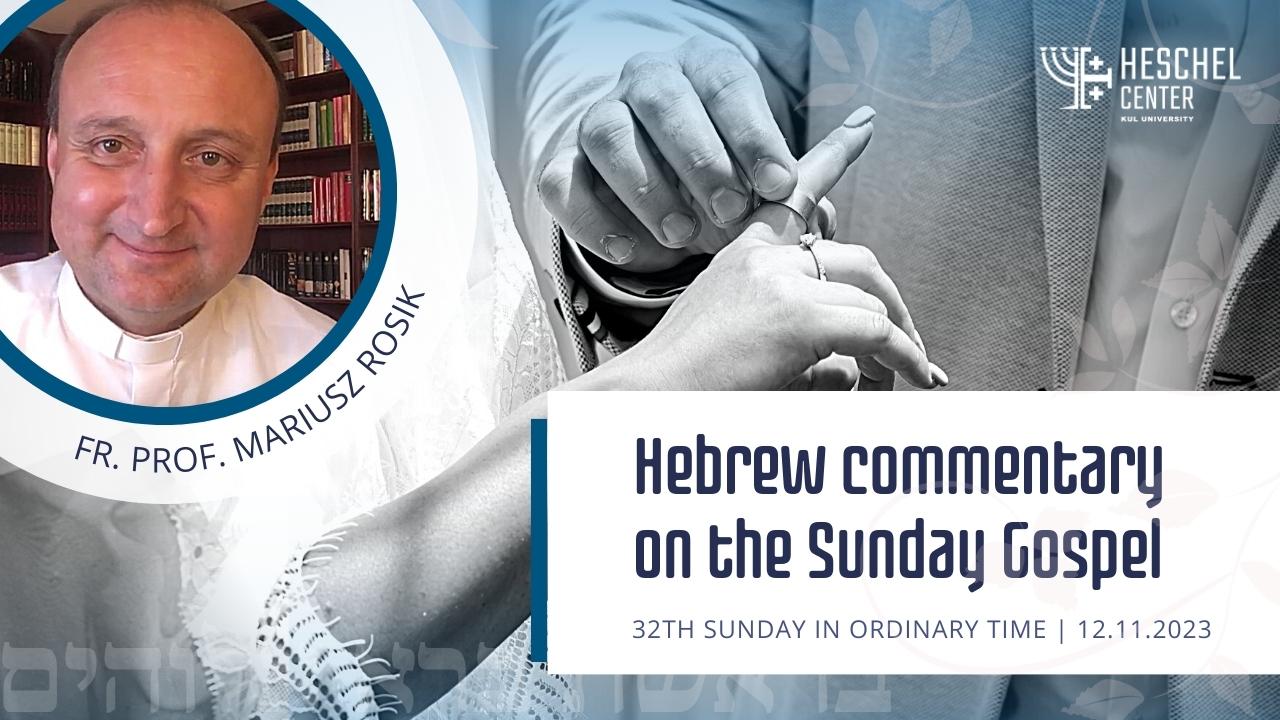Who were the virgins in Jesus’ parable at the Jewish wedding?


photo: KUL Heschel Center
Learning about Jewish wedding customs can help you understand the parable of the Wise and Foolish Virgins. Jesus describes the moment when the bridegroom and his friends set out for the bride’s house, and her friends go out to meet them, explains biblical scholar Fr. Prof. Mariusz Rosik in a commentary for the Heschel Center of the Catholic University of Lublin for Sunday, November 12. He stresses that Jesus, referring to the Jewish wedding tradition, calls for readiness and vigilance for his second coming at the parousia.
The knowledge of Jewish wedding traditions is the key to understanding Jesus’ parable of the wise and foolish virgins. On the eve of the nuptials in the evening, the groom and his friends would go to the bride’s father’s home. “Dressed in ceremonial robes, he headed the procession, accompanied by male friends. Chants were then performed, largely based on the text of the Song of Songs,” the biblical scholar points out. “The bridesmaids from the bride’s home came to meet the bridegroom while the bride was still under her father’s protection,” he adds. The two retinues would then meet halfway, proceeding together to the bride’s home.
As Fr. Rosik points out, Jesus’ parable of the wise and foolish virgins concerns the moment when the groom arrives at the bride’s house, and her friends come out to meet him. “Night is approaching, so they must have their lamps lit; they are olive lamps. Then, some of the bridesmaids realized they were running out of oil. When they went to the city to refill the oil in their lamps, the bridegroom came and closed the doors of the wedding house,” the biblical scholar explains. Only in this context does the explanation and message of the parable become eloquent. “This is how Jesus calls us to look forward to His second coming at the Parousia, in an attitude of readiness, expression of which is a lit lamp,” concludes Fr. Mariusz Rosik. “The oil in the lamps here can be a symbol of the good deeds to do in anticipation of the day of the parousia,” he adds in conclusion.
Video commentary:
The entire text of the commentary is on the website of the Heschel Center of the Catholic University of Lublin:
https://heschel.kul.pl/who-were-the-virgins-in-jesus-parable-at-the-jewish-wedding,art_104858.html
Were Pharisees adversaries of Jesus? Jesus was closer to them than to other Jewish groups >>>
Through the ears to the heart. Two commandments, four aspects of love >>>
The choicest feast – God’s promise shared by Christians and Jews >>>
Repentant sinners before the righteous – the Jewish sources of Jesus’ parable >>>
Limit of forgiveness or forgiveness without limit? >>>
Forgiveness which may do harm to the victim and the abuser >>>
The life of St. Peter – love that overcame fear >>>
Ties bound on earth and in heaven >>>
Jesus points to pagan woman as example of faith >>>
The calming of the storm on the lake in the eyes of the first Jewish listeners >>>
The mountain of transfiguration – a place of my being with God >>>
Sometimes you have to go on a long journey to find the treasure hidden within yourself >>>
Revelation reserved for the foolish, or the provocation of Jesus >>>
Jesus on the Jewish value of spiritual service to the righteous >>>
The New Torah and Jesus as the new Moses and the new Joshua >>>
The day is short, the work is plentiful, and the people are insolent, and the reward is great >>>
Eucharist – New Manna, God present here and now >>>
Hebrew Commenary to the Gospel: Three Names of One God >>>
The Pentateuch’s prophets and Moses predicted the outpouring of the Holy Spirit >>>
The end which is a new beginning – about an ever-present God >>>
Paraclete – three meanings of the Greek word hidden in the Old Testament >>>
The first covenant of God with the Jews is still valid >>>
Selective listening to Scripture – the mistake of the disciples at Emmaus >>>
God’s mercy inscribed on the pages of the Old Testament >>>
After his resurrection, why did Jesus first appear to women? >>>
Passover – the celebration of freedom and faith >>>
The more we know about Passover, the more we can understand the Last Supper >>>
Why did Jesus let Lazarus die? >>>
Who sinned, the blind man or his parents? >>>
How did the seventh man change the life of the Samaritan woman? >>>
Who was transfigured on Mount Tabor – the disciples or Jesus? >>>
The Desert – A Blessing or a Curse? >>>
KUL Heschel Center: Misunderstandings over the „eye for an eye” principle >>>
Law, Prophets, iota – we need to examine the context to understand the meaning of Jesus’ words >>>
Heschel Center KUL: What do salt, light and the city on a mountain mean to us? >>>
Heschel Center KUL: Why did the disciples, becoming „fishers of men,” abandon their nets? >>>
Hebrew Commentary to the Sunday Gospel excerpt – 2nd Sunday in Ordinary Time; Year A >>>
Jewish Commentary on the Gospel >>>
Hebrew commentary on the first Sunday of the New Year Gospel >>>
Jewish commentary on the Christmas Gospel >>>
Hebrew commentary on the Gospel for the Fourth Sunday of Advent >>>



Dodaj komentarz